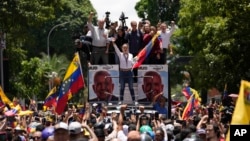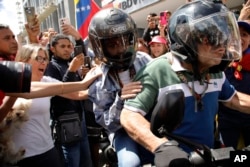Thousands of people rallied in the streets of Venezuela's capital Saturday, waving the national flag and singing the national anthem in support of an opposition candidate they believe won the presidential election by a landslide.
Authorities have declared President Nicolás Maduro the winner of last Sunday's election but have yet to produce voting tallies to prove he won. Maduro also urged his backers to attend his own "mother of all marches" later Saturday in Caracas.
The government arrested hundreds of opposition supporters who took to the streets in the days after the disputed poll, and the president and his cadres have threatened to also lock up opposition leader, María Corina Machado, and her handpicked presidential candidate, Edmundo González.
On Saturday, supporters chanted and sang as Machado arrived at the rally in Caracas. Ecstatic, they crushed around her as she climbed onto a raised platform on a truck to address the crowd.
"After six days of brutal repression, they thought they were going to silence us, intimidate or paralyze us," she told them. "The presence of every one of you here today represents the best of Venezuela."
Machado, who has been barred by Maduro's government from running for office for 15 years, had been in hiding since Tuesday, saying her life and freedom are at risk. Masked assailants ransacked the opposition’s headquarters on Friday, taking documents and vandalizing the space.
On Saturday, she held aloft a Venezuelan flag and promised that the government whose policies forced millions of Venezuelans to leave was finally coming to an end.
"We have overcome all the barriers! We have knocked them all down," Machado said. "Never has the regime been so weak."
González, who remains in hiding, was not seen at the event, and when the rally ended, Machado was given a non-descript shirt and whisked away on the back of a motorcycle.
Carmen Elena García, a 57-year-old street vendor was at the rally even though she feared a government crackdown.
"They have to respect me, and they have to respect all the Venezuelans who voted against this government," García said. "We will not accept them stealing our votes. They have to respect our votes."
A column of pro-government motorcycle riders, who have served as militia for Maduro in the past, rode near the opposition rally, but there were no confrontations. There was only a light police presence.
The Organization of American States on Saturday called for "reconciliation and justice" in Venezuela, saying "let all Venezuelans who express themselves in the streets find only an echo of peace, a peace that reflects the spirit of democracy."
Later in the day, thousands of government supporters gathered before in Maduro's office at the Miraflores national palace. Wearing red caps and shirts — the color of Maduro's party — they danced and listened to folk songs. There were fewer national flags, and a lot of umbrellas against the burning Caracas sun.
Addressing the crowd, Maduro launched into a vicious attack of the opposition, saying they "represent the hatred, the division, of fascism."
He vowed to continue to use a heavy hand against his opponents, saying 2,000 of them have been arrested already.
"This time there will be no pardon, this time there will be Tocoron," he said, referring to a notorious prison.
Machado and González, a 74-year-old former diplomat, said tally sheets they obtained from voting machines in polling centers nationwide show Maduro lost his bid for a third six-year term by a landslide.
An Associated Press analysis Friday of vote tally sheets released by the opposition coalition indicates that Gonzalez won significantly more votes in the election than the government has claimed, casting serious doubt on the official declaration that Maduro won.
Late Friday, Venezuela's high court, the Supreme Justice Tribunal, ordered the Maduro-controlled National Electoral Council to hand over the precinct vote count sheets in three days. There have been calls from multiple governments, including Maduro’s close regional allies, for Venezuela’s electoral authorities to release the precinct-level tallies, as it has after previous elections.
The AP processed almost 24,000 images of tally sheets, representing the results from 79% of voting machines. Each sheet encoded vote counts in QR codes, which the AP programmatically decoded and analyzed, resulting in tabulations of 10.26 million votes.
According to the calculations, the González received 6.89 million votes, nearly half a million more than the government says Maduro won. The tabulations also show Maduro received 3.13 million votes from the tally sheets released.
By comparison, the National Electoral Council said Friday that based on 96.87% of tally sheets, Maduro had won 6.4 million votes and Gonzalez had 5.3 million. National Electoral Council President Elvis Amoroso attributed the delay in filing complete results to attacks on the "technological infrastructure."
The tally sheets, known in Spanish as "actas," are lengthy printouts that resemble shopping receipts. They have long been considered the ultimate proof of election results in Venezuela.
The AP could not independently verify the authenticity of the 24,532 tally sheets provided by the opposition. The AP successfully extracted data from 96% of the provided vote tallies, with the remaining 4% of images too poor to parse.
The Biden administration has thrown its support firmly behind the opposition. U.S. Secretary of State Antony Blinken released a statement Thursday citing "overwhelming evidence that González was the victor and discrediting the National Electoral Council’s official results.
González posted a message on X thanking the U.S. "for recognizing the will of the Venezuelan people."
Maduro said Friday that the U.S. should stay out of Venezuela’s politics.
Venezuela sits atop the world’s largest proven crude reserves and once boasted Latin America’s most advanced economy, but it entered into a free fall marked by 130,000% hyperinflation and widespread shortages after Maduro took the helm in 2013. More than 7.7 million Venezuelans have fled the country since 2014, the largest exodus in Latin America’s recent history.
U.S. oil sanctions have only deepened the misery, and the Biden administration — which had been easing those restrictions — is now likely to ramp them up again unless Maduro agrees to some sort of transition.
There has been a flurry of diplomatic efforts by Brazil, Colombia and Mexico to convince Maduro to allow an impartial audit of the vote. On Thursday, the governments of the three countries issued a joint statement calling on Venezuela’s electoral authorities "to move forward expeditiously and publicly release" detailed voting data.





